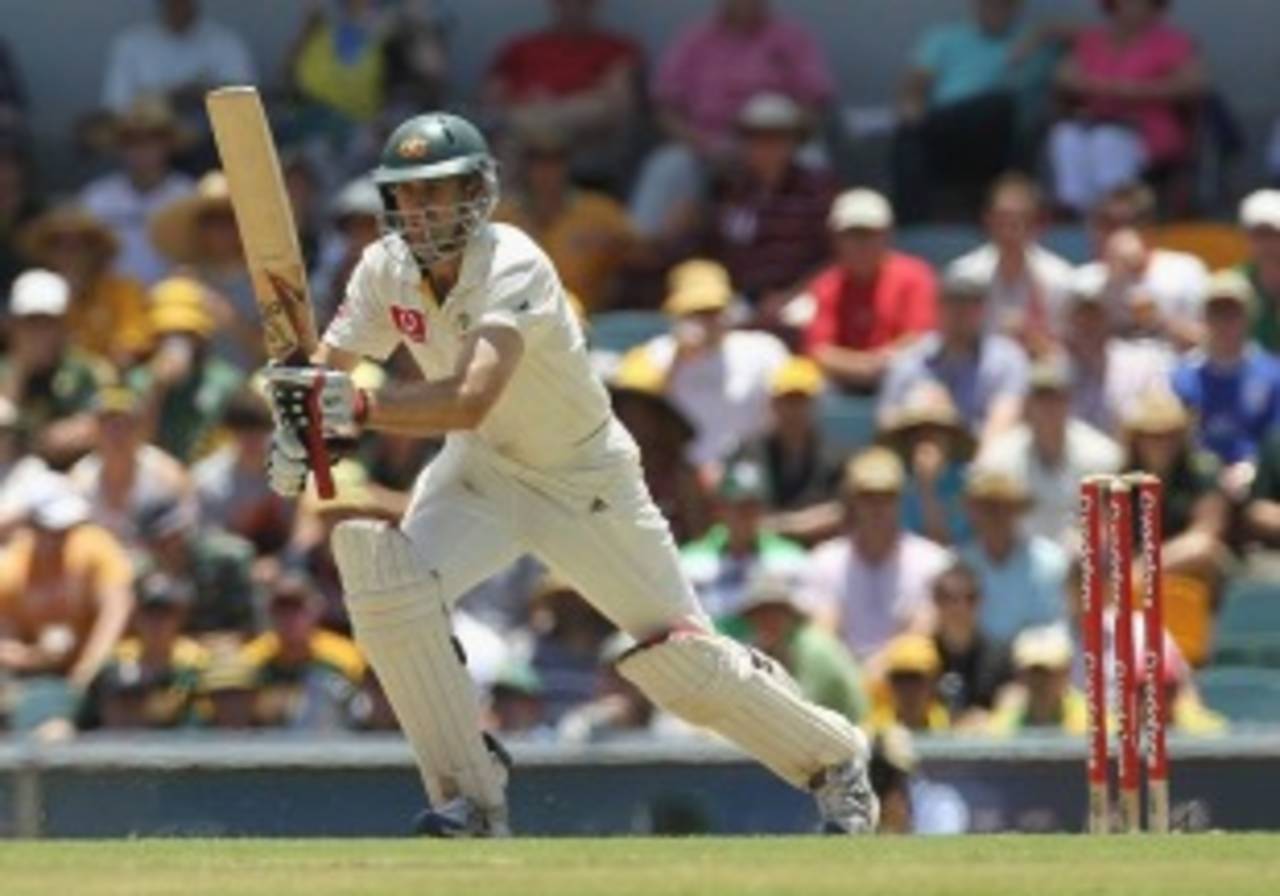A tale of two makeshift men
Not until his 307th first-class innings was Simon Katich asked to turn himself into an opening batsman
Christian Ryan
25-Feb-2013

Simon Katich scored 50 in Australia's first innings on the second day of the first Ashes Test • Getty Images
Not until his 307th first-class innings was Simon Katich asked to turn himself into an opening batsman. His cool opening batsman’s temperament was with him from birth. Today a ball rapped him near the knee-roll, everybody shouted and the third umpire hit play on the slow-motion replay. Katich survived, and forgot about it. No sooner did the next ball leave Jimmy Anderson’s hand than Katich was shuffling across the crease and tickling it off his backside for four.
Surviving and forgetting: it’s a handy knack in an opening batsman. And batting’s different for openers. All batsmen must live with the daunting sensation of starting each innings afresh on zero. For an opener, it can be doubly daunting; the team, too, is on zero. This morning Anderson wasn’t moving the ball much but nor was he offering much loose. Katich kept flirting and missing. And forgetting – and it worked. Soon he was leaving balls he felt sure about and pushing singles off balls he felt really sure about, and when he wasn’t sure he’d loosen his hands on the handle so that no edge would carry far.
Katich’s body is abnormally hairy. This, too, is abundantly handy. It helps cushion the blows every opening batsman cops. Katich copped a couple: on the shoulder blade from Stuart Broad, above the elbow off Steven Finn. He was hobbling a little, as well, a kind of limping and left-handed Gordon Greenidge. And, as with any good opener, his run trickle gently accelerated: 12 in the first hour, 19 the next. He lasted till lunch. In a sense, the job of the opening batsman – Katich’s job these days – was done.
That he wasn’t offered the job earlier in life came down to this: it was a crack-brained idea and no one had ever thought of it. For concealing his opener’s temperament were a dasher’s quicksilver feet, moving him classically into position on true WACA pitches, where he’d hook bouncers off his nose in late afternoon sunshine. At the end of his second full season Katich was pronounced Wisden Australia’s Sheffield Shield Cricketer of the Year. The excellent Perth cricket scribe John Townsend summed him up thus: “His technique is simple and marked by stillness in the stance, economy of movement.”
Oh, Katich could be a gorgeous sight then, not so much anymore. It used to be that Australian Crawl referred to either a style of swimming or a short-lived ’80s pop band. Nowadays it sums up nothing so perfectly as Katich’s modus operandi.
His partner Shane Watson, a fellow latecomer to opening, has not reinvented his style. You sense with Watson that his success as an opener comes despite, rather than because of, the way he plays. Any ball that’s overpitched, and some balls that aren’t overpitched, he drives to the fence. It is a fabulous skill to have. But it is fabulous no matter where you bat. And sometimes, when the ball is swinging, Watson’s feet freeze. There was a moment today, torn between hooking and playing safe, when he was struck in the armpit. There’d have been not a flicker of indecision in his head had be been batting at six. And about mid-afternoon today you couldn’t help wondering, a little sadly, whether Australia might soon have a vacancy at number six.
Earlier Watson, like Katich, had a confident lbw shout sent to the third umpire. Like Katich, Watson survived. Surviving and forgetting: it’s a handy knack. Except that, unlike Katich, Watson didn’t forget. No sooner did the next ball leave Jimmy Anderson’s hand than Watson – his head bowed a little lower than normal, his eyes a touch downcast – was edging it to slip.
Christian Ryan is a writer based in Melbourne. He is the author of Golden Boy: Kim Hughes and the Bad Old Days of Australian Cricket and, most recently Australia: Story of a Cricket Country